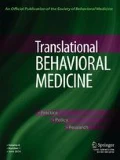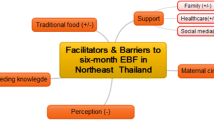Abstract
Communicating findings to study participants and their communities is a practice that often gets overlooked or receives low prioritization by research investigators, but is crucially important. The purpose of this study was to describe the process and community response to the dissemination of results from the Kisumu Breastfeeding Study (KiBS), specifically in terms of (1) community research knowledge and expectations and (2) impressions of result dissemination efforts. A qualitative evaluation was completed for 10 result dissemination events using focus group discussions (FGDs) (n = 10; total number of participants = 98). An inductive, thematic qualitative data analysis was completed in NVivo 8.0. Overall, FGD participants expressed great appreciation for being given information on the study results. Participants had a good understanding of what research entails and had specific expectations for the process, including that the community receive information about the study, not only at the end of the study but also at regular intervals throughout the study’s conduct. They also wanted to receive the communications from a credible source, the principal investigator preferably. Other expectations centered on better community and research interactions and development and the use of community collaborators. Impressions of KiBS result dissemination events were positive, but suggestions for the future included having the event in a larger area, inviting more people, having more written materials, and putting the information in an entertaining format such as skits or movies. Sharing study findings with local community members is essential and beneficial to the researchers’ long-term engagement with communities and importantly, the successful implementation of study findings when appropriate. It is imperative that dissemination of results be embedded as an integral part of research project planning and development.
Similar content being viewed by others
References
Arean PA, GallagherThompson D. Issues and recommendations for the recruitment and retention of older ethnic minority adults into clinical research. J Consult Clin Psychol. 1996; 64: 875-880.
Bailey RC, Moses S, Parker CB, et al. Male circumcision for HIV prevention in young men in Kisumu, Kenya: a randomised controlled trial. Lancet. 2007; 369: 643-656.
Boyatzis R. Transforming qualitative information: thematic analysis and code development. Thousand Oaks: Sage Publications; 1998.
Campbell JC, Bunting S. Voices and paradigms—perspectives on critical and feminist theory in nursing. Adv Nurs Sci. 1991; 13: 1-15.
Castanho MARB. Pop-science: facts or fiction? Friend or foe? Interciencia. 2003; 28: 665-668.
Cerrato S. Pop-science on the internet: how Ulisse makes the ends meet. Ireland: In Cork; 2002.
Centers for Disease Control and Prevention (CDC). Principles of community engagement. CDC/ATSDR Committee on Commounity Engagement. 1997.
Chen PG, Diaz N, Lucas G, Rosenthal MS. Dissemination of results in community-based participatory research. Am J Prevent Med. 2010; 39: 372-378.
Emanuel EJ, Wendler D, Killen J, Grady C. What makes clinical research in developing countries ethical? The benchmarks of ethical research. J Infect Dis. 2004; 189: 930-937.
Fernandez C, Kodish E, Weijer C. Informing study participants of research. IRB: Ethics & Human Research. 2003.
Ferris LE, Sass-Kortsak A. Sharing research findings with research participants and communities. Int J Occup Environ Med. 2011; 2.
Flaskerud JH, Anderson N. Disseminating the results of participant-focused research. J Transcult Nurs. 1999; 10: 340-349.
Foster CG. International ethical guidelines for biomedical research involving human subjects. J Med Ethics. 1994; 20: 123.
Ghersi D, Clarke M, Berlin J, et al. Reporting the findings of clinical trials: a discussion paper. Bull World Health Organ. 2008; 86: 492-493.
Green J, Thorogood N. Qualitative methods for health research. 3rd ed. Sage; 2013
Kenya National Bureau of Statistics. Kenya Demographic and Health Survey 2008-09. Kenya National Bureau of Statistics; 2010.
Kreps GL. Disseminating relevant health information to underserved audiences: implications of the Digital Divide Pilot Projects. J Med Libr Assoc. 2005; 93: S68.
Lairumbi G, Michael P, Fitzpatrick R, English M. Ethics in practice: the state of the debate on promoting the social value of global health research in resource poor settings particularly Africa. BMC Med Ethics. 2011; 12: 22.
Lairumbi GM, Molyneux S, Snow RW, Marsh K, Peshu N, English M. Promoting the social value of research in Kenya: examining the practical aspects of collaborative partnerships using an ethical framework. Soc Sci Med. 2008; 67: 734-747.
Lavery JV, Tinadana PO, Scott TW, et al. Towards a framework for community engagement in global health research. Trends Parasitol. 2010; 26: 279-283.
Lillie-Blanton M, Hoffman SC. Conducting an assessment of health needs and resources in a racial/ethnic minority community. Health Serv Res. 1995; 30: 225.
Mann H. Research ethics committees and public dissemination of clinical trial results. Lancet. 2002; 360: 406-408.
Marsh V, Kamuya D, Rowa Y, Gikonyo C, Molyneux S. Beginning community engagement at a busy biomedical research programme: experiences from the KEMRI CGMRC-Wellcome Trust Research Programme, Kilifi, Kenya. Soc Sci Med. 2008; 67: 721-733.
National Bioethics Advisory Commission. Ethical and policy issues in international research: clinical trials in developing countries. Washington (DC): National Bioethics Advisory Commission; 2001.
Newman PA. Towards a science of community engagement. Lancet. 2006; 367: 302.
Partridge AH, Winer EP. Informing clinical trial participants about study results. J Am Med Assoc. 2002; 288: 363-365.
Paskett ED, DeGraffinreid C, Tatum CM, Margitic SE. The recruitment of African-Americans to cancer prevention and control studies. Prev Med. 1996; 25: 547-553.
Philpott A, Maher D, Grosskurth H. Translating HIV/AIDS research findings into policy: lessons from a case study of the “Mwanza trial”. Health Policy Plan. 2002; 17: 196-201.
Pich J, Carne X, Arnaiz JA, Gomez B, Trilla A, Rodes J. Role of a research ethics committee in follow-up and publication of results. Lancet. 2003; 361: 1015-1016.
Tabak RG, Khoong EC, Chambers DA, Brownson RC. Bridging research and practice: models for dissemination and implementation research. Am J Prev Med. 2012; 43(3): 337-350.
Thomas TK, Masaba R, Borkowf CB, et al. Triple-antiretroviral prophylaxis to prevent mother-to-child HIV transmission through breastfeeding—the Kisumu Breastfeeding Study, Kenya: a clinical trial. PLoS Med. 2011; 8: e1001015.
Tindana PO, Singh JA, Tracy CS, et al. Grand challenges in global health: community engagement in research in developing countries. PLoS Med. 2007; 4: e273.
Wilson PM, Petticrew M, Calnan MW, Nazareth I. Disseminating research findings: what should researchers do? A systematic scoping review of conceptual frameworks. Implement Sci. 2010; 5: 91.
Acknowledgments
We are indebted to the KiBS participants and staff and the Kisumu community who took part in the dissemination events and subsequently in the FGDs.
Conflict of interest
All authors were, at the time of working on this paper, employees of the US or Kenyan Government and have no conflicts of interest to disclose. The findings and conclusions in this report are published with the approval of the Director, Kenya Medical Research Institutes, are those of the authors, and do not necessarily represent the views of the Centers for Diseases Control and Prevention or that of the Kenya Medical Research Institute.
Funding source
Funding for this study was provided by the Centers for Disease Control and Prevention (CDC), Atlanta, GA, USA.
Author information
Authors and Affiliations
Corresponding author
Additional information
Implications
Policy: It is imperative that the dissemination of results be an integral part of research project planning and development, with explicit resource allocation and oversight by the institutional review boards (IRBs).
Research: Persuade researchers to prioritize returning study findings to the communities they study and enhance interaction and collaboration with the community members and their leaders.
Practice: Thoughtful, creative and community-informed presentation of study findings enable such populations to access relevant health information in order to make informed health decisions about seeking care and support, limiting avoidable health risks, and promoting their own health.
About this article
Cite this article
Ondenge, K., McLellan-Lemal, E., Awuonda, E. et al. Disseminating results: community response and input on Kisumu breastfeeding study. Behav. Med. Pract. Policy Res. 5, 207–215 (2015). https://doi.org/10.1007/s13142-014-0303-y
Published:
Issue Date:
DOI: https://doi.org/10.1007/s13142-014-0303-y



